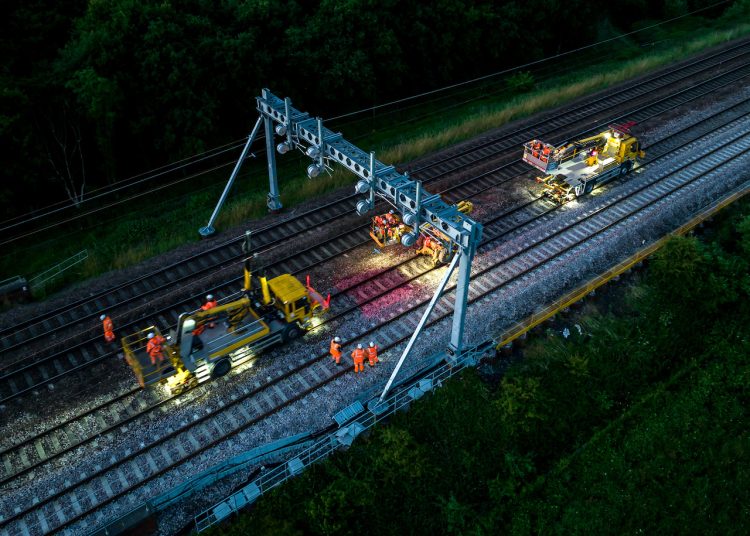The installation of electric wires has taken place between Church Fenton and Colton Junction which is where trains join the East Coast Main Line from Leeds making their way into York. This stretch of railway is one of the busiest in the north and sees over 100 trains operate on it every day.
The work marks the first stage of the vast Transpennine Route Upgrade which recently saw investment trebled to more than £9m, will eventually see full electrification between York, Leeds, Huddersfield and Manchester whilst enabling more environmentally friendly electric and hybrid trains to operate at speeds of up to 125mph, which is 30mph more than they can currently operate at.

Rob McIntosh, Managing Director for Network Rail’s Eastern region said: “We’ve reached a major milestone on our journey to bring cleaner, greener trains to the north and deliver a better railway which people can rely on.
“Our teams in York and Manchester are working in tandem to electrify sections of the route and will eventually connect to unlock faster, more frequent services and help passengers get to where they need to be, on time.”
Rail Minister Huw Merriman said: “Our multi-billion pound Transpennine Route upgrade will transform journeys for passengers across the North of England, with faster, more frequent services and improved accessibility.
“This is the first major milestone on the way to a fully electrified route between York, Leeds, Huddersfield and Manchester, which will reduce journey times and save 87,000 tonnes of carbon emissions each year.”
Network Rail engineers have been working over the past four months for just under 9,000 hours in order to install 37 miles of overhead wire. The work was completed through the night and over weekends in order to keep disruption to a minimum for passengers.
On completion, the upgrade will see the entire 70-mile route which crosses the Pennines electrified, and will see up to 87,000 of carbon emissions saved each year, the equivalent of 5.9 million car journeys along the same route. The project will also provide better air quality as well as quieter trains for people who live close to the railway.
In keeping with the eco-friendly theme, construction of the overhead line equipment took place locally at the Transpennine Route Upgrade’s Joseph Lynn Logistics Hub which is located near Sherburn-in-Elmet, the equipment was then moved to the site via train.






Responses
But strangely the current extension of the OHLE does not reach Church Fenton Railway Station platforms, where if it had it could’ve meant an EMU shuttle into York straight away
Why would any operator run a shuttle between those two stations? Sounds like you live on the island of sodor in your head.
According to updates we get as residents they are not planning to energise the wires for another two years so no shuttle to York even if the OHLE did stretch to Church Fenton station.
The electrifcation should also reach Neville Hill Leeds and to continue from Leeds to Manchester Victoria via Stalybridge & Huddersfield. Plus the Midland Main Line electrification to continue on from Market Harborough to Nottingham, Leicester, Derby, Sheffield and Leeds. And electrification on other non-electrified lines in Northern England if possible.
And maybe thinking about adding a new bay platform to be built at Carnforth with overhead wires so that Northern can operate a shuttle service from Preston and Lancashire to Carnforth using their Class 319 or Class 331 EMUs.
Very positive first step, but will the wires ever reach Hull – or do we get neglected as usual.
Karl Tuner and I are working on getting the electrification to Hull. But, our track needs upgrading First, its in terrible shape. There’s no point in putting up wires until the track is done. The changed which need to be make would require the OHLE to be pulled down again and rebuilt.
I don’t get much flavour of urgency or indignation from that reply. Hull has been neglected for decades, and all the discussion about northern powerhouses and trans – pennine transport links seems to take place in cheerful ignorance that the city even exists. When I was a boy in the 50s, BR ran a rather posh businessman’s DMU service direct from Hull to Liverpool. It closed of course, and since then Hull might as well be adrift somewhere off the Dogger Bank so far as the central planners are concerned.